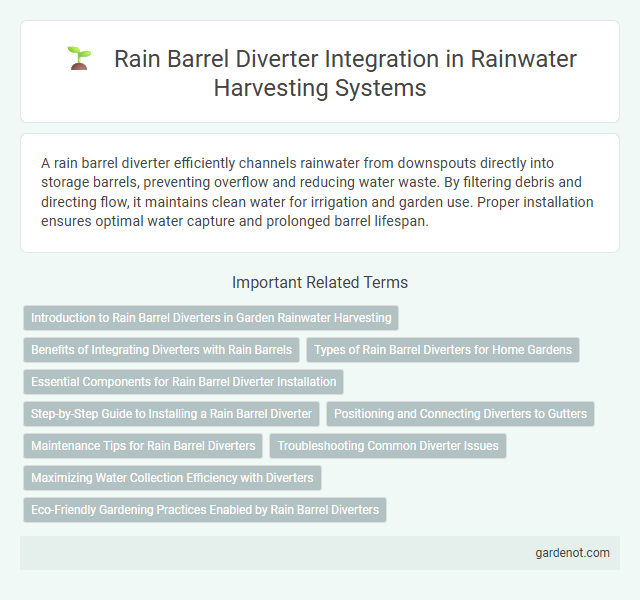A rain barrel diverter efficiently channels rainwater from downspouts directly into storage barrels, preventing overflow and reducing water waste. By filtering debris and directing flow, it maintains clean water for irrigation and garden use. Proper installation ensures optimal water capture and prolonged barrel lifespan.
Introduction to Rain Barrel Diverters in Garden Rainwater Harvesting
Rain barrel diverters efficiently channel excess rainwater from downspouts into storage barrels, preventing water wastage and reducing runoff. They feature a simple design that redirects flow through a filter system to keep debris out, ensuring cleaner collected water for garden use. Integrating rain barrel diverters enhances water conservation efforts and supports sustainable irrigation practices.
Benefits of Integrating Diverters with Rain Barrels
Integrating rain barrel diverters enhances water quality by filtering debris before it enters the storage barrel, reducing contamination and maintenance needs. Diverters also optimize water collection efficiency by directing overflow away from the foundation, preventing soil erosion and structural damage. This system maximizes rainwater capture while protecting both your rain barrel and property.
Types of Rain Barrel Diverters for Home Gardens
Rain barrel diverters for home gardens come in several types, including inline, first-flush, and leaf catcher models, each designed to optimize water flow and quality. Inline diverters redirect overflow from gutters directly into barrels, while first-flush diverters prevent initial contaminated runoff from entering storage. Leaf catcher diverters filter debris during water collection, ensuring cleaner rainwater for garden irrigation.
Essential Components for Rain Barrel Diverter Installation
Rain barrel diverters require a diverter kit, including a downspout diverter, flexible hose, and a spigot for water access. Proper installation involves attaching the diverter to the downspout to channel rainwater efficiently into the barrel while preventing overflow. Essential components also include a filter screen to block debris and a secure overflow outlet to redirect excess water safely away from foundations.
Step-by-Step Guide to Installing a Rain Barrel Diverter
Installing a rain barrel diverter begins by selecting a suitable location on the downspout, typically 6-12 inches above the barrel. Cut the downspout at the marked point using a hacksaw, then fit the diverter into place, ensuring the included splash guard directs overflow away from the foundation. Finally, connect the diverter's hose to the rain barrel inlet and secure all parts with brackets or clamps to ensure proper water flow and stability.
Positioning and Connecting Diverters to Gutters
Proper positioning of a rain barrel diverter is crucial for efficient rainwater collection, typically installed at a downspout where water flow is concentrated. Securely connecting the diverter to the gutter involves cutting the downspout and attaching the diverter with a tight seal to prevent leaks and direct water into the barrel. Correct alignment ensures optimal water flow, reduces overflow risk, and enhances the overall effectiveness of the rainwater harvesting system.
Maintenance Tips for Rain Barrel Diverters
Regularly inspect and clean the rain barrel diverter to prevent debris and sediment buildup that can block water flow. Check and clear the screen or filter monthly to maintain optimal function and reduce clogging caused by leaves and dirt. Ensure all seals and connections are tight to avoid leaks and water loss during heavy rain events.
Troubleshooting Common Diverter Issues
Rain barrel diverters often face common issues such as clogs caused by leaves and debris, which block water flow and reduce efficiency. Regular inspection and cleaning of the mesh filter and diverter outlet ensure optimal water redirection to the barrel while preventing overflow. Adjusting the diverter's position and sealing any leaks with waterproof sealant can resolve water loss and improve system performance.
Maximizing Water Collection Efficiency with Diverters
Rain barrel diverters significantly enhance water collection efficiency by directing overflow from gutters into storage barrels while preventing debris from entering the system. These diverters optimize rainwater capture by controlling flow rates and ensuring clean water storage, reducing contamination and maintenance needs. Proper installation and maintenance of rain barrel diverters maximize harvested water volume, making it ideal for irrigation and sustainable water management.
Eco-Friendly Gardening Practices Enabled by Rain Barrel Diverters
Rain barrel diverters enable eco-friendly gardening practices by efficiently channeling rainwater from downspouts into storage barrels, reducing dependence on municipal water supplies. This method conserves water, lowers utility bills, and minimizes runoff that can carry pollutants into local waterways. Using rain barrel diverters supports sustainable gardening by providing plants with natural, chemical-free water that enhances soil health and plant growth.
Rain barrel diverter Infographic

 gardenot.com
gardenot.com